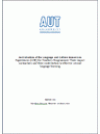This report was commissioned in 2008 by the Ministry of Education to determine the effectiveness of the language and culture immersion experiences for teachers on Language and Culture Immersion Experiences (LCIE) programmes.
This report provides recommendations which will inform future language and culture immersion initiatives and assist with our long term planning for languages support and delivery. It covers a research period from 2005 to 2009.
Methodology
The evaluation comprised three parts:
- a comprehensive qualitative and quantitative questionnaire administered at the end of 2008 to 114 participants in immersions from 2005
- a qualitative study of ten short-term immersion programme teachers (two weeks to three months) conducted through the second part of 2008 and early 2009
- four case studies of long-term (ten months to one year) immersion programme teachers conducted through the second part of 2008.
Key Results
The evaluation found that, as a result of the immersion programmes, teachers’ immersion language proficiency improved in most instances. Teachers’ perceptions were that gains were most noticeable in speaking, followed by listening and, to a lesser extent, in reading and writing. Teachers also noted gains in confidence, and in their becoming more autonomous as language learners. Teachers appeared to be confident and comfortable talking about the development of their cultural knowledge, but they were less confident about their understanding of the relationship between language and culture. While some teachers appeared to be familiar with the concept of ICC in terms of interaction with people of other cultures, awareness of differences and similarities and of preventing overemphasis on foreignness and stereotypes, understanding was varied, with no articulated links to ICC theory and research, nor to intercultural language teaching.
The immersion experience had a major effect on teachers’ confidence in their language teaching and for some there was an increase in their understanding of language teaching as well. In addition, student language learning and other student outcomes were reported to be strengthened, particularly in regard to attitudes to learning and increased use of the immersion language. Other gains were also evident, such as greater student retention, increased numbers of students learning languages and an increased interest by students in undertaking an immersion experience themselves. Perceptions of a change in students’ attitudes to ICC were least positive, with 70% of teachers seeing no or minimal positive change, which may well reflect teachers’ own uncertainty about ICC.
While there were a number of reported and observed gains from the language and culture immersion experiences, the full potential of immersion programmes was not harnessed as well as it might have been. The evaluation highlighted the need for more structure to immersion experiences, including the need for a higher level of pre-departure information for teachers, goal-setting support and more information and learning about the Ministry of Education’s expectations for intercultural language teaching. Also important is the need for a full debriefing following time overseas, structured opportunities for dissemination of experiences and learning, and a programme for ongoing professional development.

